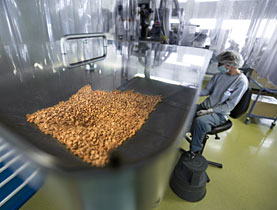
Pharma-chemical lobby demands unhindered trade

The influential umbrella group of the Swiss pharmaceutical and chemical industries has demanded that the government act to remove global trade barriers.
The sector’s lobby group said customs duties, red tape and patent abuses are draining funds away from vital research. But it insists a price-inflating ban on parallel imports should stay in place.
A study commissioned by the Association of the Swiss Chemical and Pharmaceutical Companies showed the sector dominating the Swiss export market. Pharmaceutical and chemical products account for more than 35 per cent of all Swiss goods sold abroad.
The industry has grown twice as fast as the overall Swiss economy in the past decade, the report said. It now employs 70,000 people, with another 130,000 positions indirectly dependent on its productivity.
But the association, presenting its views at a conference in Zurich on Wednesday, complained that the lifeblood of both branches – research and development – is being drained by a series of global obstacles.
Customs duties, which vary tremendously from country to country, cost the industry SFr300 million ($270 million) a year – about seven per cent of research funding.
In addition, different countries vary in their interpretation of international standard patent protection laws. Swiss pharmaceutical giant Novartis lost a court case in India last year challenging the country’s refusal to grant patent protection for its Gleevec drug.
Parallel import debate
Association director Beat Moser called on the Swiss government to create a level playing field during its regular negotiations within the World Trade Organization. Failing that, such demands should be made when creating free trade agreements with selected countries.
“We have a worldwide standard for patent protection and it should be applied everywhere according to the spirit of the agreement. We also want to make trade as free as possible in the world by getting rid of all customs taxes and import regulations,” he told swissinfo.
The association said free trade agreement talks should centre on the developing powerhouse economies of Brazil, Russia, India and China, as well as the United States.
But Moser rejected growing calls to end Switzerland’s ban on parallel imports, a restriction that pushes up the price of drugs in the country.
Swiss companies would be forced to cut their research operations if their goods were allowed to be imported into Switzerland from cheaper markets at lower prices, he told swissinfo.
“The consumer view is only one side of the argument, you also have to see what innovation brings in terms of value creation and employment,” Moser said.
“You can lower the prices but you should not just focus on the short-term view of the consumer. What would you do tomorrow if the industry is damaged?” he added.
The Swiss Foundation for Consumer Protection last year rejected the idea that parallel imports would damage pharmaceutical research, arguing that the Swiss market represented only about 1.2 per cent of the companies’ turnover.
swissinfo, Matthew Allen in Zurich
The report on the Swiss pharmaceutical and chemical industries was conducted by respected research group BAK Basel Economics.
It found that employment in the sector had risen by about 13% since 1998, compared with 7% growth in the overall economy.
The industry has grown in value by around 5% per year since 2000, compared with 2.3% overall annual economic growth.
Productivity has also improved with SFr149 of value created for every working hour (SFr68 for the Swiss economy).
The sector’s proportion of total exports has risen from 22% in 1990 to 35% in 2006.
The Swiss Society of Chemical Industries was founded as the umbrella organisation of the pharmaceutical and chemical industries in 1882. It now represents 250 member companies, including Roche, Novartis, Ciba, Sika, Clariant, Syngenta and Givaudan.
The industry has thrived through specialisation, and is among the world leaders in diagnostics, cancer and HIV treatments, crop protection, fragrances, industrial and textile chemicals, and vitamin production.
The global sales of Switzerland’s top ten pharmaceutical and chemical companies totalled SFr132.1 billion ($119 billion) in 2006. About 43% of these sales were in North America, 37% in Europe, while only 3% were in the domestic Swiss market.
Switzerland is ranked as the ninth largest export nation in this sector, accounting for 4% of all products exported throughout the world.

In compliance with the JTI standards
More: SWI swissinfo.ch certified by the Journalism Trust Initiative































You can find an overview of ongoing debates with our journalists here . Please join us!
If you want to start a conversation about a topic raised in this article or want to report factual errors, email us at english@swissinfo.ch.